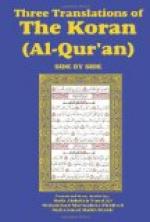19 See Sura [lxv.] xxi. 49.
20 Lit. slay one another.
21 The Talmudists relate how the Israelites who had died, on hearing the divine voice, etc., were restored by the intercession of the Law itself. Sanh. 5.
22 By storing them up in violation of God’s command.
23 Jericho according to some commentators, Jerusalem according to others, but see verse 58.
24 See Sura [lxxxvii.] vii. 162.
25 Lit. all men. This incident is perhaps inadvertently borrowed from Ex. xv. 27.
26 This passage (comp. xxvi. 59) is one of the numerous anachronisms which abound in the Koran and prove the gross ignorance of the Arabian Prophet.
27 The Sabeites are identical with the Mendaites, or so-called Christians of S. John, residing in the marshy district at the mouth of the Euphrates, but are not the same with the star-worshipping Sabians of Harran in Mesopotamia. See D’Herbelot, Bibl. Or. under the word Sabi; Assemani, Bibl. Or. iii. 2, 609. For curious details as to the elements of the Sabeite religion, see Chwolson’s SSabier and SSabaismus I.
28 See Sura [lxxxvii.] vii. 170.
29 See Sura [lxxxvii.] vii. 164.
30 Compare Numb. xix.; Deut. xxii. 1-9. The cow was to be sacrificed in order that a murderer might be discovered through the miracle to be wrought on the corpse by a piece of her flesh.
31 To please you, O Muslims.
32 This is one of the passages which shews great familiarity with the habits of the Jews, on the part of Muhammad. See Maracci’s Prodr. i. 44. Wahl’s Einleitung, xxx. xxxv.
33 The Pentateuch. This passage shews that the art of writing was known in Medina shortly after the Hejira.
34 Forty days; the period during which they worshipped the calf.
35 The blood of those who are as your own flesh.
36 Two Jewish tribes (Koreidha and Nadhir) in alliance with certain Arab tribes who were at war, destroyed one another’s abodes, but redeemed the Jewish captives, professing that they were commanded to do this by the Law. So the commentators.
37 Gabriel. Muhammad either knowingly rejected the divinity of the Holy Ghost, or confounded Gabriel announcing the conception, with the Holy Spirit that overshadowed Mary. It is probable that Muhammad’s ideas of the Spirit were at first indefinite, but that the two expressions, Gabriel and the Holy Spirit, became ultimately synonymous. See note on Sura [lxvii.] xvii. 87. Geiger (p. 82) quotes an instance in which the Jewish expositors understand the distinctly-speaking Spirit (Sanhedr. 44) of Gabriel.
38 The gift of the prophetic office, etc., to a pagan Arab and not to a Jew.
39 Matt. xxiii. 37.
40 See Sura vii. 170, p. 309.
41 Comp. 1 Tim. v. 24.




